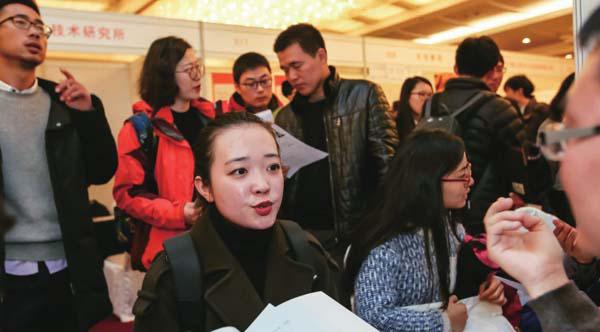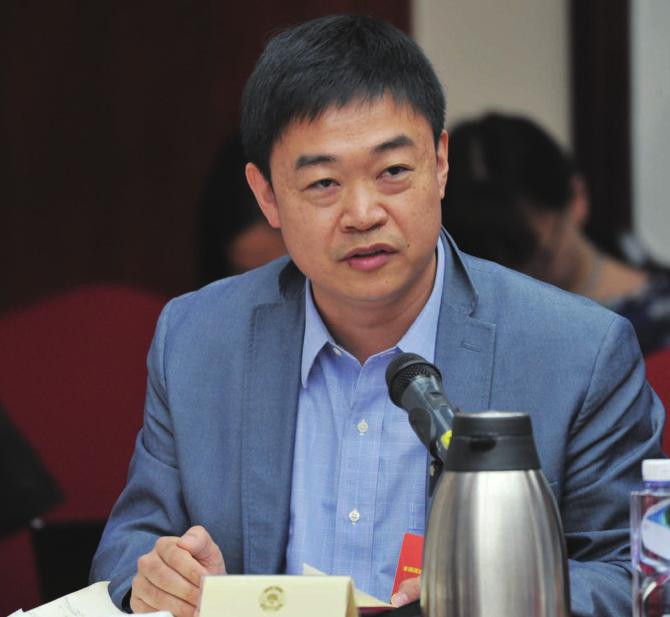East,West,Home Is Best
2018-12-04ByLiFangfang
By Li Fangfang
In his 12th year in the U.S., Zheng Chunyang hit a ceiling. Zheng, a 42-year-old Chinese scientist in the application of biomedical sciences, got his masters and doctoral degrees from the University of Rochester and pursued post-doctoral studies at Cornell University in the United States.
“Progress is gradual with an annual increase in salary. Thats what life is all about there,” Zheng said. But he wanted to contribute to his home country.
He also found it difficult to think and live as an American. “I didnt grow up with American football,” Zheng said.
Thanks to a talent project, Zheng got the chance to return to China in 2010. Launched in 2008, the project mainly provides assistance for native talent studying or working overseas to come back to China and further their research and entrepreneurship. Zheng received 4 million yuan ($633,443) as a startup grant from the government.
He founded Robustnique Corp. Ltd. in the Tianjin Binhai New Area in 2010. Everything was built from scratch as he led his team in the development of dozens of tool enzymes which were then taken up by researchers and other brands. Through innovative achievements, Zheng also established a successful brand selling skin care products that have since become popular among Chinese customers. The profi tability of these popular products is helping the company further their other areas of research.
This year, Zhengs achievements saw him nominated as a member of the Chinese Peoples Political Consultative Conference(CPPCC) National Committee, where one of his proposals was on the topic of cosmetics. He believes that domestic cosmetics are high in safety but must improve in advanced technology. He also suggested that the government guide the industry to increase investment in research and development (R&D;).
A golden era
Two years can be enough to make a signifi cant difference in China. In 2008, two years prior to Zhengs homecoming, 40-year-old Liu Yi quit a senior position and a comfortable life in the United States and returned to China to further his career as the environmental protection industry was just emerging.
Ten years later, Liu believes he got the timing just right with his return. “Its a golden era for startups here in China,” he said.
Having attained his masters and doctoral degrees in engine energy saving and emission reduction in the United States, he spotted a high demand for exhaust treatment in China as well as a huge market.
“As the number of automobiles in China increased, pollution would get worse,” Liu said. He then founded Act Blue, a company specializing in exhaust treatment, in central Chinas Anhui Province shortly after he got back.
In the initial period it was hard to make ends meet due to the small size of the market, as well as the prohibitively high cost of R&D; and a shortage of equipment and trained professionals, which together applied mounting pressure to Lius plan.
In spite of these challenges, he refused to accept a venture capital investment of 45 million yuan ($7.13 million) from investors who demanded he cater to the market and lower the emission threshold. Liu wouldnt be swayed, believing it of vital importance to make the perfect product from the very beginning.
The diffi culties were far greater than expected, but Liu never lost faith in his original decision.
“What touched me is that the government offered great support, which helped the company to survive many difficulties,”Liu said.
Noticing his predicament, the Anhui local government provided a loan of 20 million yuan ($3 million) and offered him a building for his factory as well as housing facilities for employees to fuel Lius vision.
After nine years of hard work, Act Blue has developed a series of engine exhaust purifi cation products targeting diesel, gasoline and natural gas.
“Our products can remove 95 percent of main pollutants from a cars exhaust,”Liu said. “Our partners include not only top Chinese car makers, but also industry giants from the United States and Japan.”
“I truly believe that ones personal career should be consistent with the requirements of the era, and then you will make it,” Liu said.
This January Liu became a CPPCC National Committee member, and he is glad for the responsibility and opportunity to participate in the administration of state affairs.
Liu was pleased to hear that this years Report on the Work of the Government revealed plans to address the excess emissions of diesel trucks in 2018, which will be another way forward in the battle against pollution.
“The report made a summary of Chinas work over the past five years, and laid out a blueprint for the future. In fact, it was in many ways like my own work report about what I have done in the past and what I plan to do in the future,” Liu said.
Growing trend
In the past few years, Zheng has been impressed by Chinas entrepreneurial environment. “Those talent- and entrepreneurshiporiented policies can streamline procedures with related departments also keen to help,” he said, particularly in the fi ve years after the 18th National Congress of the Communist Party of China in 2012.
In the 2018 Government Work Report, both Chinese with experience studying overseas and foreign talent are encouraged to start businesses in China.
“Many overseas Chinese are still looking for a chance to come back,” Zheng said. “The trend has changed.”
Some 432,500 people came back to China after studying overseas in 2016, a 58.48-percent increase on 2012, according to a report published by the Ministry of Education in January 2017.
In 2002, the second year after Chinas ascension to the World Trade Organization, the ratio of people who had gone abroad to those who had returned was around 7:1, while in the year 2010 the ratio was closer to 2:1, according to China Youth Daily. It stood at 1.28:1 in 2015.
“Chinas development depended on a demographic advantage in the past, while in the coming 30 years, our growth will rely on talented people and trained professionals,”said Wang Huiyao, Director General of the Center for China and Globalization.
In the 1960s, thousands of Chinese scientists gave up good living conditions and sound research environments to come back and made significant contributions to the countrys development in science, economy and defense. This is regarded as the fi rst major wave of returning overseas Chinese.
Their spirit continues to affect younger generations today. In Lius opinion, “Every generation has their mission. The past is already gone; the future is ours.”
“In the past, people would talk about how much a returned scientist had sacrifi ced for the development of his country. But times have changed. Now we can pursue our careers and at the same time live a better life,”Zheng said.
